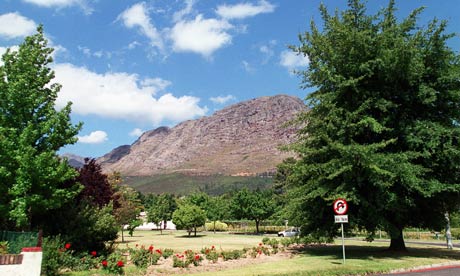
Last month I visited my brother in Cape Town. He put together the most amazing itinerary: the "big five" in Kruger National Park; lounging on the beach and watching the cold surf in Kleinmond; seafood on the seashore in Hermanus; wine and escargots in Franschhoek for the price of burgers and coke back home; flowers and weddings in the Company Gardens, and hiking up Lion's Head.
But what I was by far the most grateful for was the tireless manner in which he drove me to every bookstore I could find, and his patience as I browsed through miles of new and used books. After which, I can happily report that Cape Town and its environs is home not only to the world's most fecund floral kingdom, but also a thriving literary life.
Almost everyone I met spoke of Cape Town's growing literary community; of how, after years of neglect by the chains, independent bookstores such as The Book Lounge and Kalk Bay Books were now, as the Lounge's Mervyn Sloman put it, "filling the void, treating customers with respect, hiring people passionate about the profession, and caring about more than just stock turnover".
Just looking through the Book Lounge's spring readings line-up was exhausting: three or four authors a week, minimum. It was there I heard André Brink talk about his recently published memoirs, A Fork in the Road, and where I met Ben Williams, owner of SABooks, a cluster of microsites for authors and publishers, featuring news and reviews, who described the state of South Africa's publishing industry as one of "high ferment". The heat has apparently been building for the past 10 years to a point where there are now more books and local authors being published in the country than ever before.
In fact, South Africa is currently in the throes of its own Harry Potter-sized success story: Spud, a comic novel about adolescent life in a boarding school, written by actor/playwright John van de Ruit, has sold 250,000 copies. The third Spud book in the series (a kind of Adrian Mole on speed) was launched at the Cape Town book fair recently where fans reportedly queued for hours, while the author signed copies.
Local crime fiction is also enjoying a sales boom. As Margie Orford, a successful novelist whose Blood Rose has just been optioned for film, tells me, "The spectre of the past is there - racialised cities and identities, a psycho-geography of violence and spatial separation. There is also exuberant storytelling, where the big issues of the state of literature are resolved through the interaction between the odd casts of characters. To me the cops, the crooks, the murderers, are the coalface of our rainbow nation."
During the first Cape Town book fair, Orford spoke on a crime panel to a half-empty room. This year (only three years later) the panel spoke to a packed-to-capacity roomful of fans of local crime fiction.
No one's quite sure of the reason for this success, although Stephen Johnson, managing director of Random House Struik, thinks it has to do with a new freedom to tell stories, to write not against things, but for them. But - and it's a big but - despite this heady picture, South Africa's book-buying public is, according to Jenny Hobbs, literary director of the Franschhoek writers' festival, "too small to fund even a scant living for most local writers".
Much of the country's population struggles with low literacy. "Our government's track record since the 1994 election has been pathetic when it comes to library funding," says Hobbs. "Though literacy and reading support programmes are picking up as the government, at last, becomes more serious about the essential value of reading. What we need as well are cheaper popular paperbacks, especially in the major black languages, and to abolish the unconscionable 14% VAT on books."
Getting people who are literate to read is one thing. Teaching those who aren't is quite another. Those with the most disposable income are still primarily white. This relatively small percentage of the population represents the majority of book-buyers.
The government needs to understand that simple schooling is not enough. They must also recognise that books need to be more accessible, that the entire population needs to be encouraged to revere reading. Until things are done to make this happen, the traditional rich markets may well continue to flourish, the publishing industry may continue to go squirrel with all the work it's getting, but a far bigger, potentially more lucrative nut will remain uncracked.

